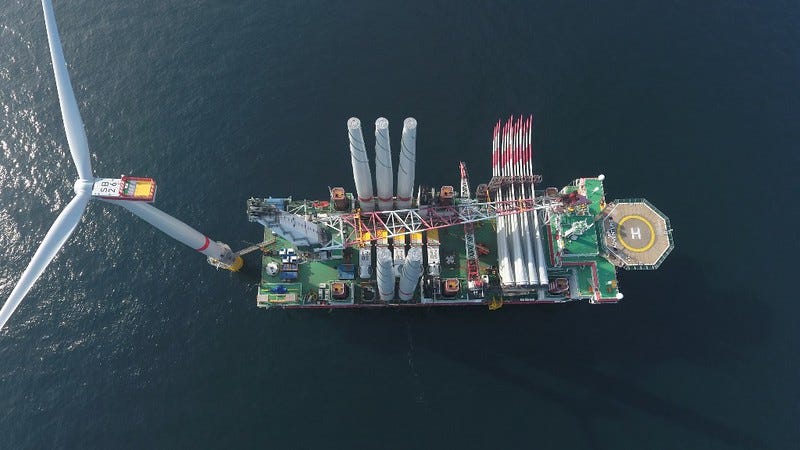ESG fatigue settles in on fund managers, regulators as energy crisis grows
Welcome to Callaway Climate Insights. Only one week left until our Dublin Climate Summit, coming just as Europe adopts a Russian oil embargo. Register today!
To read all our insights, news and in-depth interviews, please subscribe and support our great climate finance journalism. Callaway Climate Insights publishes Tuesdays and Thursdays for everybody.
The lock-step march of investors and financial regulators toward environmental, social and governance funds in the past five years has begun to unravel in the face of chaos in global markets, war in the Ukraine and a Europe-wide energy crisis.
Griping among investors about “box-checking” regulations and rigid disclosure rules, such as the ones proposed by the Securities and Exchange Commission last month, were prevalent in private meetings at the Berkshire Hathaway annual conference last weekend in Omaha, according to a person who attended some of them.
Germany’s financial regulator on Wednesday delayed plans to classify investment funds as sustainable, citing an unstable environment. And sales of ESG funds have begun to slow in the face of continued market declines.
Large investors complaining about regulators is nothing new. We flagged back last fall that some investors in Asia were tiring of the proliferation of ESG products and new disclosure rules. But the advent of new disclosure campaigns in the U.S. and Europe since COP26 last November, combined with day-to-day market drama tied to rising interest rates, inflation, and Russia’s invasion this spring are increasingly making them appear more of a distraction than a new opportunity.
In times of great upheaval, climate change always seems to lose its priority billing, until the next heat wave or wildfire season. While regulators should be applauded for trying to improve risk disclosures and govern what has become a messy and misleading introduction of new climate products, for now it seems, the market is otherwise preoccupied.
More insights below . . . .
Don’t forget to contact me directly if you have suggestions or ideas at dcallaway@callawayclimateinsights.com.
The Dublin Climate Summit is a week away. Don’t miss it!

Announcing the Dublin Climate Summit, our signature conference of the year, coming a week from today, May 12 in Dublin, Ireland and featuring the Irish Prime Minister, or Taoiseach, Micheal Martin; the EU’s Paschale Donohoe; Blackstone’s Jean Rogers; and New Zealand Climate Ambassador Kay Harrison. Many others from The City of London, Wall Street, Silicon Valley and Ireland’s business community will also be there. The event is free: Attend in person or stream live. We’d love to see you there. Check out the list of speakers and the agenda, find out more information, and register for the Dublin Climate Summit.
Zeus: Russian oil embargo too little, too late

. . . . Europe dramatically raised the stakes in the West’s campaign against Russia’s invasion of Ukraine this week, laying down an embargo of all Russian oil by the end of the year, writes David Callaway. But the phased-in approach over many months will do little to deter Russia now, while it is actively firing missiles at Ukranian cities and innocent people. How can we stand behind Ukraine and support the brave resistance fighters when we’re still paying Russia $1 billion a day for its oil? A further escalation is going to be needed.
Thursday’s subscriber insights: Are EV sales really tied to gas prices?

. . . . Common wisdom on the impact of higher fuel prices on EV sales is that the latter will go up. Not so fast, say new studies, which predict people will lose interest in electric vehicles once gasoline prices come down. Reasons: EVs are relatively pricey and potential owners still have range anxiety. Can this be fixed? Read more here. . . .
. . . . Everyone loves a beaver, right? They’re cute, creative and hardworking. For many landowners, though, the affection is not so much as they build messy dams and diverting waterways. But a new study says their activities are important for the climate and water quality. Read more here. . . .
. . . . AccuWeather is out this week with its 2022 wildfire forecast, and it’s not looking promising for those of us who live in the U.S. West. Between 68,000 to 72,000 fires are expected to burn about 8.1 million to 8.3 million acres in the U.S., AccuWeather predicted. That’s compared to 7.7 million acres burned last year, which included two of the largest fires in California history. Already, large parts of New Mexico and Arizona are burning. And it’s only May. . . .
. . . . Where’s my electric plane? It might just be taking off. Textron (TXT) has just closed its acquisition of Italy’s Pipistrel, which produced the world’s first electric-powered aircraft to be internationally certified as being safe for passenger flights. Read more here. . . .
. . . . Can the coral reef be rigged? Wind giant Ørsted is going to try to grow corals on the foundations of its Greater Changhua offshore wind project in Taiwan. The ReCoral project aims to grow colonies of corals in the stable temperature waters around offshore wind farms. Read more here. . . .
. . . . Provocative question of the week, seen on LinkedIn yesterday: If Russia fires a javelin missile, destroying a manufacturing plant in Ukraine, who gets the blame for the resulting carbon emissions? Russia, Ukraine, NATO, or the missile manufacturer? Our answer: Who cares? It all rolls up to Putin. . . .
Editor’s picks: Greening crypto; plus, a climate finance ‘jargon buster’
Editor’s note: Above, from May the 4th, but we couldn’t resist.
Can crypto go greener?
With the U.S. now the world’s largest cryptocurrency mining destination, some states are stepping into the battle over miners’ carbon footprint and efforts to decrease emissions from the crypto mining process. Karin Rives writes for S&P Global Market Intelligence that while crypto miners are promising to “to transform global banking and e-commerce systems while offering investors outsize returns — and to do it in a low-emissions way,” the industry’s energy demands are surging. In New York, Texas and other states, lawmakers are considering legislation to control the energy impacts of crypto mining, especially on their renewable energy capacity. Rives reports that crypto miner Marathon Digital Holdings announced it will move from a coal plant in Montana to wind and solar farms in other states such as Texas to meet its goal to be carbon neutral by the end of 2022. The company is already deploying a 280 MW facility in west Texas.
Climate change jargon buster
From AQI to zero carbon, have you ever looked twice at a puzzling environmental phrase or climate finance term? The Financial Times has done a “jargon buster” feature on the terminology. Climate Change A to Z is a handy roundup of the acronyms, new phrases and growing collection of terms “commonly used in the climate change discussion.” You’ll see that Afolu (agriculture, forestry and other land use) is a term that is used in the Intergovernmental Panel on Climate Change report on climate change. And that Gfanz is the Glasgow Finance Alliance for Net Zero Group of financial institutions backing the UN Race to Zero campaign that has pledged to decarbonize the world economy and reach net zero emissions by 2050. The entries under “H” do a great job of explaining green, blue, gray, brown, pink, purple and turquoise hydrogen. Bookmark this one.
Latest findings: New research, studies and projects
Financing climate-change policies and consumer opinions
Climate change policies have been rising to the top of the global political agenda, but how should governments finance them? The authors of this working paper from the Center for Economic Studies and Ifo Institute, titled How to Finance Climate Change Policies? Evidence from Consumers’ Beliefs, say that public economists propose solutions based on economic theory, but their political feasibility depends on voters’ support, and ordinary households often neglect economic theory and have different views about efficiency and fairness. From the abstract: “We design a large-scale information experiment to assess a representative population’s beliefs about alternative forms of financing. … Informed consumers strongly support the introduction of a VAT-style CO₂ tax after learning that the rich contribute more to climate change than the poor, but do not support increasing taxes on older people when learning that they also pollute more. Moreover, consumers who learn that certain populations, due to luck, gain economically from climate change strongly oppose redistribution from gainers to losers of climate change. Consumers also oppose financing policies to fight climate change via public debt, implying higher costs for future generations. Market-based solutions, such as private insurance for those exposed to climate-change risk, are strongly opposed across the board.” Authors: Francesco D'Acunto, Boston College; Sascha Möhrle, CESifo; Florian Neumeier, CESifo; Andreas Peichl, CESifo; Michael Weber, University of Chicago - Finance; National Bureau of Economic Research.
More of the latest research:
Climate Liability for Wildfire Emissions from Federal Forests
Factor Investing in Paris: Managing Climate Change Risk in Portfolio Construction
Words to live by . . . .
“Water is the driving force of all nature.” — Leonardo da Vinci.






